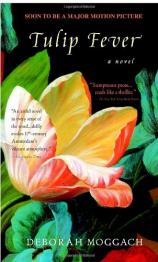Reading Group Guide
Discussion Questions
Tulip Fever

1. What is tulip fever?
2. Tulips, flowers, and petals play a far greater role in the story than as simply a trading commodity. How? Why?
3. "Turn the paintings round and enjoy their beauty, for they shall outlast us all," writes Cornelis in his final note. How is this ironic?
4. In the 1630s, Amsterdam society was very hierarchical. Why is it that the lower class characters triumph in their goals and happiness? Do they want something so different from what the upper class protagonists want?
5. Jan tells his apprentice that "all painting is deception," and yet when painting "Naked Woman on a Bed" he tells Sophia that, "this painting will not lie, it will tell the truth." Ultimately which is true? How are the paintings in the book truthful or deceptive?
6. A water motif runs throughout the book. What is its significance? Why do you think the author chose to include it so prominently?
7. Cornelis, so proud and admiring of his city of Amsterdam, is the only one to leave it behind. Why?
8. Which proves more seductive: love or tulips? Which proves more destructive?
9. Religion and belief are present throughout the book. In the end, although all the characters have sinned, one (Sophia) turns to the church and one (Cornelis) turns away from it entirely. Why? Does Sophia make her decision based entirely on self-preservation or is there more to it?
10. Does Maria's belief in superstition suit her and guide her better than the others' practice of organized religion?
11. If, as it seems at its most simplistic, the novel shows us that "the wicked shall be punished," why do Maria and Willem end up the way they do?
12. If Willem had confronted Maria rather than joining the Navy, what options might have been open to Sophia and Jan? Did, in essence, Willem cause everyone's downfall?
13. Do you think Sophia and Jan did the right thing in planning to indulge their love rather than their obligations? Could they have been successful if circumstances had been different?
14. How does author seem to feel about parental love versus romantic love? Cornelis is deprived of both kinds -- twice, which impacts him more?
15. Does Maria's belief in superstition suit her and guide her better than the others' practice of organized religion?
16. If, as it seems at its most simplistic, the novel shows us that "the wicked shall be punished," why do Maria and Willem end up the way they do?
17. If Willem had confronted Maria rather than joining the Navy, what options might have been open to Sophia and Jan? Did, in essence, Willem cause everyone's downfall?
18. Do you think Sophia and Jan did the right thing in planning to indulge their love rather than their obligations? Could they have been successful if circumstances had been different?
19. How does author seem to feel about parental love versus romantic love? Cornelis is deprived of both kinds -- twice. Which impacts him more?
Tulip Fever
- Publication Date: April 10, 2001
- Paperback: 288 pages
- Publisher: Dial Press Trade Paperback
- ISBN-10: 0385334923
- ISBN-13: 9780385334921







